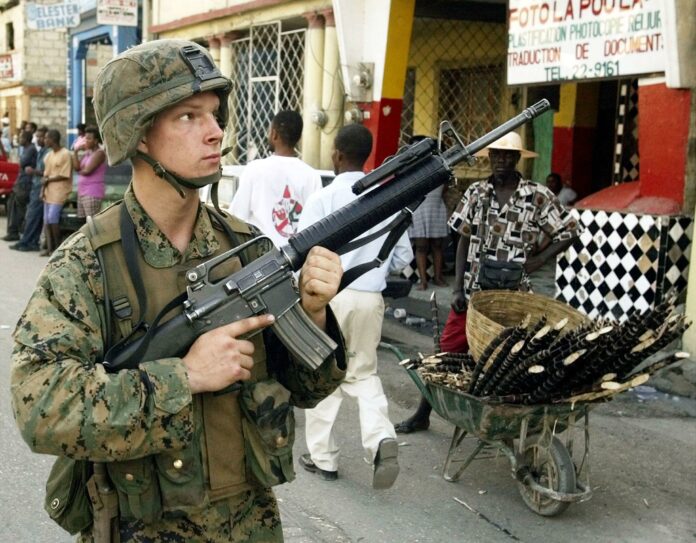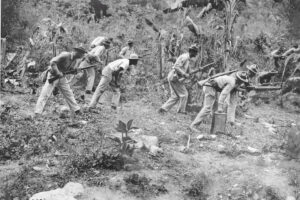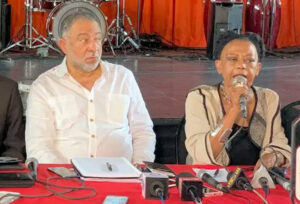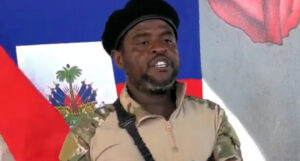
The lede of the Guardian’s Oct. 7 article on Haiti, repeated with slight variations throughout the international mainstream media, was that “Haiti’s government has authorized the prime minister, Ariel Henry, to ask the international community for a ‘specialized armed force’ to address a crisis caused by a blockade of the country’s main fuel port” by “a coalition of gangs” which has “crippled transportation and forced businesses and hospitals to halt operations” as well as causing “a shortage of bottled water, just as the country confirmed a new outbreak of cholera, the spread of which is controlled through hygiene and clean water.”
The weekly Haïti Liberté summed up such reporting in its Oct. 5 editorial: “The recent declarations made by the capitalist system’s representatives want to… make the ‘gangs’ responsible for all the nation’s problems in order to fool national and international public opinion… and justify their military intervention… to defend their interests and allies in Haiti.”
The Guardian’s lede needs some translation for those not familiar with Haiti.
“Haiti’s government” is nothing more than a gaggle of political charlatans and opportunists appointed by Henry, who was in turn anointed by the Core Group, which is led by the U.S. Embassy but includes the ambassadors of Brazil, Canada, France, Germany, and Spain, as well as representatives of the United Nations and Organization of American States (OAS). It was formed in 2004 following the U.S.-orchestrated coup against progressive Haitian President Jean-Bertrand Aristide.

Furthermore, the only elected government officials left in Haiti, ten Senators, unanimously passed a resolution on Oct. 9 to demand an “immediate suspension” of Henry’s request to Guterres for foreign military intervention. Henry’s Oct. 9 letter said: “The support we ask for should help us to retake control of the situation, restore state authority, make the rule of law respected, and envisage in the near future a return to the normal functioning of democratic institutions.”
Ariel Henry is a long-time U.S. government agent, who sat on the Washington-concocted “Council of Sages,” which appointed the post-2004-coup de facto government of Gérard Latortue. Henry, like the U.S., also appears to be complicit in the Jul. 7, 2021 murder of President Jovenel Moïse. The slain president had named – but not sworn in – Henry to be Prime Minister two days before his assassination, but any shred of legitimacy that Henry may have had ended on Feb. 7, 2022, the undisputed end of Moïse’s term.
The “blockade of the country’s main fuel port,” the Varreux Terminal on the Port-au-Prince bay waterfront, by “a coalition of gangs” refers to the Revolutionary Forces of the G9 Family and Allies, Mess with One, You Mess with All. The FRG9 is an alliance of crime-fighting armed neighborhood groups led by former policeman Jimmy Cherizier, nicknamed “Barbecue.”
The FRG9 has wholeheartedly joined in the nationwide mobilization to demand Ariel Henry’s resignation. (The FRG9 almost drove Henry from power with a similar tactic last autumn.) Barricades have been erected throughout the capital and towns across Haiti, not just near the Varreux Terminal, an area the FRG9 controls. Therefore, it is specious to blame Varreux’s “blockade” on the FRG9, because roads are barricaded everywhere, making fuel deliveries impossible. Furthermore, not one popular demonstration or group across Haiti has called on the FRG9 to remove its barricade outside the Varreux terminal.
But Washington has exclusively sanctioned and denounced the FRG9 and Cherizier, not the confederation of kidnapping, criminal gangs known as G-Pèp. The two armed federations – one criminal, one anti-crime – have battled fiercely since the summer, but the U.S. and its allied media consistently conflate the two simply as “the gangs.”
Washington has targeted the FRG9 instead of G-Pèp (which works with Henry’s governing coalition and the police) because Cherizier observed in 2021 that “the country has been controlled by a small group of people who decide everything …They put guns into the poor neighborhoods for us to fight with one another for their benefit.” While denouncing the “stinking, rotten bourgeoisie,” Cherizier has stated that “we have to overturn the whole system, where 12 families have taken the nation hostage.” That system “is not good, stinks, and is corrupt.”
Referring to a mural in his Delmas 6 neighborhood depicting Che Guevara, Cherizier declared, “we made that mural, and we intend to make murals of other figures like … Thomas Sankara and … Fidel Castro, to depict people who have engaged in struggle.”

These words about and aspirations for social revolution have panicked Washington and its Haitian bourgeois allies.
The Haitian masses have protested continuously and countrywide since September, when Henry announced International Monetary Fund (IMF)-dictated fuel price hikes. Shortages of fuel and food have resulted, along with runaway inflation. Banks and stores are shuttered. Students are marching as schools remain closed. Labor unions, including the all important public transportation drivers, have been on strike. The pattern has repeated intermittently for ten years.
Haitians are suffering. Presently, 40% of the people are food insecure. Some 4.9 million of them (43%) need humanitarian assistance. Life expectancy at birth is 63.7 years. Haiti’s poverty rate is 58.5%, with 73.5 % of adult Haitians living on less than $5.50 per day.
Electoral politics are fractured. Secretary of State Hillary Clinton facilitated President Michel Martelly’s presidential victory in 2011. President Moïse in 2017 was the choice of 600,000 voters – out of six million eligible. He illegally extended his presidential term by a year. There have been no presidential elections for six years, no elected mayors or deputies (the equivalent of Congresspeople), and only one-third of the Senate in office for over a year. There are no scheduled elections ahead.
The U.S. Global Fragility Act of 2019 authorizes multi-agency intervention in “fragile” countries like Haiti, the Pentagon being the centerpiece. The U.S. establishment’s Council on Foreign Relations (CFR) wants U.S. soldiers to instruct Haitian police on handling “gangs.” OAS chief Luis Almagro calls for military occupation and is trying to reach the 23 nation threshold (he only has 19 now) that Washington’s “Ministry of Colonial Affairs” needs to invoke for the first time the 2001 “InterAmerican Charter,” which authorizes an OAS military intervention, similar to what Washington undertook in the neighboring Dominican Republic in 1965. UN Secretary General Antonio Guterres wants international support for training Haitian police and is now trying to win Security Council approval to deputize “one country” (likely the U.S. or Canada) to militarily intervene in response to Henry’s controversial request.
Former U.S. Special Envoy to Haiti Daniel Foote weighed in with a choice: either “send a company of special forces trainers to teach the police and set up an anti-gang task force, or send 25,000 troops at some undetermined but imminent period in the future.” The Dominican Republic has stationed troops at its border with Haiti and also is calling for foreign military intervention into Haiti.
Henry insists he will eventually carry out presidential elections. The prevailing opinion holds that he won’t be able to any time soon.

The Core Group backs an important coalition announced by the so-called Montana Accord on Aug. 30, 2021. It provides for a National Transition Council that would prepare for national elections in two years and govern the country in the meantime. The Council in January 2022 chose banker Fritz Alphonse Jean as transitional president and former senator Steven Benoit as prime minister. They have not yet assumed those jobs.
The Montana group consists of “civil society organizations and powerful political figures” from traditional political parties. The radical popular organization MOLEGHAF has pulled out, as has Aristide’s Lavalas Family party. The foremost leader of the Montana Accord is Magali Comeau Denis, who was a cheerleader for the U.S.-organized 2004 coup against Aristide and the Culture Minister of Gérard Latortue’s post-coup de facto regime. Ariel Henry also worked with the pro-coup Democratic Convergence, a political party coalition that in 2000 plotted to supplant President Aristide and sabotage his inauguration.
The CFR wants the U.S. government to make a shotgun wedding between Henry and the Montana Accord, or, failing that, switch outright to Montana leadership. The CFR and Daniel Foote support the Montana Accord because it disingenuously calls for a “Haitian-led solution,” an important fig-leaf for U.S. neocolonial rule. The Montana Group has even demagogically denounced Ariel Henry’s request for foreign intervention as “treason,” despite Magali Comeau Denis’ sordid history, a recent article by Montana’s #2, Jacques Ted St. Dic, calling on Washington to provide “security support needed for [Montana’s] transitional government to protect Haitians from gang violence,” and several brown-nosing sessions the Montana Accord leaders held with Washington’s officials, pleading for the approval which they seem to have finally won.
Washington is already in deep with the National Police of Haiti (PNH). The U.S. government provided the PNH with $312 million in weapons and training between 2010 and 2020, and with $20 million in 2021. The State Department contributed $28 million for SWAT training in July. As of 2019, there were illegal arms in Haiti worth half a million dollars, mostly from the United States.
Meanwhile, the FRG9 is preparing to do battle with U.S. invaders, as it has with a PNH/G-Pèp alliance in recent weeks. “We know that U.S. troops are preparing to trample on sovereign Haitian soil,” Cherizier told Haïti Liberté on Oct. 10. “We are devising our strategies and tactics to deal with them.”
It would be the first time such a large organized force has resisted a U.S. intervention since U.S. Marines first invaded Haiti on Jul. 28, 1915. During their 19 year military occupation, the U.S. faced five years of organized guerilla resistance from the Cacos, whom they also called “bandits,” like the “gangs” today. The Cacos’ military defeat was followed however by 14 years of strikes, demonstrations, and other protests.
In 1915, U.S. Marines first invaded and then appointed President Sudre Dartiguenave to invite them to stay. A century later, Washington first appointed their puppet, Ariel Henry, and then had him do the inviting.
Fed up with foreign military interventions, Haitians, both in Haiti and across its diaspora, appear ready to reject Washington’s attempt to trick them into a fourth deployment in a century and to fiercely resist it if it happens, no matter what the international sponsor.
This article is an expansion on a piece by W.T. Whitney Jr. originally published in CounterPunch. Whitney is a retired pediatrician and political journalist living in Maine.










[…] deployment is justified by Haitian de facto Prime Minister Ariel Henry’s request to the United Nations on October 7, 2022 for a foreign “special military intervention” into Haiti to fight “gang […]
[…] deployment is justified by Haitian de facto Prime Minister Ariel Henry’s request to the United Nations on October 7, 2022 for a foreign “special military intervention” into Haiti to fight “gang […]
J’aime vraiment lire des messages qui peuvent faire réfléchir les gens. Aussi, merci de me permettre de commenter!
[…] The following article was published in Haiti Liberté. […]
[…] The following article was published in Haiti Liberté. […]